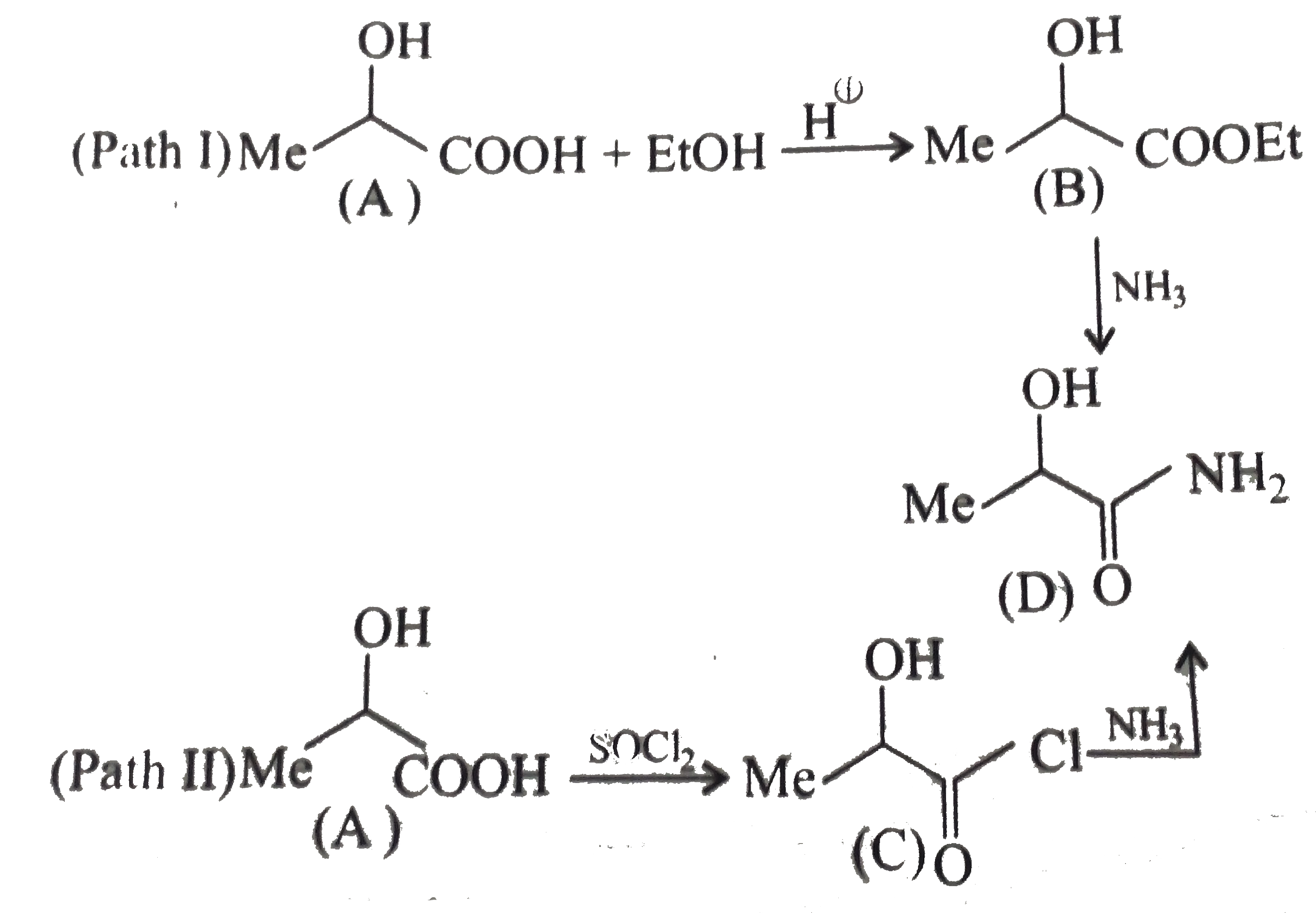The following reaction is used for the preparation of oxygen gas in the laboratory
2KClO3(s)Heat−−−−→Catalyst2KCl(s)+3O2(g)
Which of the following statement(s) is/are not correct about the reaction?
Potassium is undergoing oxidation
Chlorine is undergoing oxidation
Oxygen is reduced
None of the species are undergoing oxidation or reduction
The correct Answer is:a,b,c,d
To determine which statements are not correct about the given reaction, we need to analyze the oxidation states of the elements involved in the reaction:
Given Reaction:
2KClO3(s)Heat, Catalyst−−−−−−−−→2KCl(s)+3O2(g)
Step 1: Assign Oxidation States
1. Potassium (K) in KClO3 and KCl:
- K in KClO3: +1
- K in KCl: +1
2. Chlorine (Cl) in KClO3 and KCl:
- Let the oxidation state of Cl in KClO3 be x.
- The equation for KClO3 is:
+1+x+3(−2)=0
+1+x−6=0
x=+5
- Cl in KCl: -1
3. Oxygen (O) in KClO3 and O2:
- O in KClO3: -2
- O in O2 (elemental form): 0
Step 2: Determine Changes in Oxidation States
- Potassium (K): No change (remains +1).
- Chlorine (Cl): Changes from +5 in KClO3 to -1 in KCl. This indicates a gain of electrons (reduction).
- Oxygen (O): Changes from -2 in KClO3 to 0 in O2. This indicates a loss of electrons (oxidation).
Step 3: Analyze the Statements
1. Potassium is undergoing oxidation: Incorrect, as there is no change in the oxidation state of potassium.
2. Chlorine is undergoing oxidation: Incorrect, as chlorine is being reduced (gaining electrons).
3. Oxygen is reduced: Incorrect, as oxygen is being oxidized (losing electrons).
4. None of the species are undergoing oxidation or reduction: Incorrect, as we have identified that chlorine is reduced and oxygen is oxidized.
Conclusion
All the statements provided are incorrect regarding the reaction.
Final Answer
All statements (1, 2, 3, and 4) are not correct.
---
2KClO3(s)Heat, Catalyst−−−−−−−−→2KCl(s)+3O2(g)
1. Potassium (K) in KClO3 and KCl:
- K in KClO3: +1
- K in KCl: +1
- Let the oxidation state of Cl in KClO3 be x.
- The equation for KClO3 is:
+1+x+3(−2)=0
+1+x−6=0
x=+5
- Cl in KCl: -1
- O in KClO3: -2
- O in O2 (elemental form): 0
- Potassium (K): No change (remains +1).
- Chlorine (Cl): Changes from +5 in KClO3 to -1 in KCl. This indicates a gain of electrons (reduction).
- Oxygen (O): Changes from -2 in KClO3 to 0 in O2. This indicates a loss of electrons (oxidation).
1. Potassium is undergoing oxidation: Incorrect, as there is no change in the oxidation state of potassium.
2. Chlorine is undergoing oxidation: Incorrect, as chlorine is being reduced (gaining electrons).
3. Oxygen is reduced: Incorrect, as oxygen is being oxidized (losing electrons).
4. None of the species are undergoing oxidation or reduction: Incorrect, as we have identified that chlorine is reduced and oxygen is oxidized.
All the statements provided are incorrect regarding the reaction.
All statements (1, 2, 3, and 4) are not correct.
Topper's Solved these Questions
- BOOK - NCERT EXEMPLAR ENGLISHCHAPTER - REDOX REACTIONSEXERCISE - SHORT ANSWER TYPE QUESTIONS12videos
REDOX REACTIONS
- BOOK - NCERT EXEMPLAR ENGLISHCHAPTER - REDOX REACTIONSEXERCISE - ASSERTION AND REASON4videos
REDOX REACTIONS
- BOOK - NCERT EXEMPLAR ENGLISHCHAPTER - ORGANIC CHEMISTRY : SOME BASIC PRINCIPLES AND TECHNIQUESEXERCISE - Long Answer type question6videos
ORGANIC CHEMISTRY : SOME BASIC PRINCIPLES AND TECHNIQUES
- BOOK - NCERT EXEMPLAR ENGLISHCHAPTER - SOME BASIC CONCEPTS OF CHEMISTRYEXERCISE - All Questions45videos
SOME BASIC CONCEPTS OF CHEMISTRY
Similar Questions
The following reaction is used for the preparation of oxygen gas in the laboratory
2KClO3(s)Heat−−−−→Catalyst2KCl(s)+3O2(g)
Which of the following statement(s) is/are correct about the reaction?View SolutionWhich of the following statement (s) is //are correct about the preparation of an amide ?
 .View Solution
.View Solution
Knowledge Check
- Question 1 - Select One
Which of the following statement is not correct about SN2 reactions of alkyl halides?
ANucleophile attacks the carbon from the side opposite to where the leaving group is attached.BThe bond formation and bond breaking take place in one step.CThe rate of reaction depends upon the concentration of nucleophile.DSN2 mechanism is predominant in tertiary alkyl halides.
which of the following statement is correct for the reactivity in SN2 reaction ?
View SolutionWhich of the following reaction(s) is /are used for the preparation of anhydrous FeCl3?
View SolutionAt high pressure the following reaction is zero order.
2NH3(g)1130K−−−−−−−−−→Platinum catalystN2(g)+3H2(g)
Which of the following options are correct for this reaction ?View SolutionComplete the following reactions :
CO(g)+H2(g)Δ−−−−→catalystView SolutionFor the reaction 2KClO3→2KCl+3O2 which statements (s) is (are) correct?
View SolutionEtCOCl(A)(i)H2N.OH−−−−−−−→(ii)ӨOH(B)EtOH−−−→(C)
Which of the following statements are correct about the given reaction ?View SolutionIn the reaction :
4Fe(s)+3O2(g)→4Fe3+(aq)+6O2−(aq)
which of the following statement is incorrect ?View Solution

